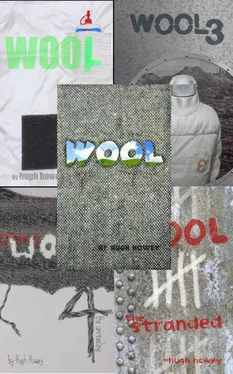“Well then, let me tell you where I’m going with this,” she told Marnes. “I want to find this girl’s father, look him in the eyes, and ask him why, in the nearly twenty years since his daughter moved to Mechanical, he hasn’t visited her. Not once.”
She looked back at Marnes, saw him frowning at her beneath his mustache.
“And why she hasn’t once made her way up to see him,” she added.
••••
The traffic thinned as they made their way into the teens and past the upper apartments. With each step down, Jahns dreaded having to reclaim those lost inches on the way back up. This was the easy part, she reminded herself. The descent was like the uncoiling of a steel spring, pushing her down. It reminded Jahns of nightmares she’d had of drowning. Silly nightmares, considering she’d never seen enough water to submerge herself in, much less enough that she couldn’t stand to breathe. But they were like the occasional dreams of falling from great heights, some legacy of another time, broken fragments unearthed in each of their sleeping minds that suggested: We weren’t supposed to live like this.
And so the descent, this spiraling downward, was much like the imagined drowning that swallowed her at night. It felt inexorable and inextricable. Like a weight pulling her down combined with the knowledge that she’d never be able to claw her way back up.
They passed the garment district next, the land of multi-colored coveralls and the place her balls of yarn came from. The smell of the dyes and other chemicals drifted over the landing. A window cut into the curving cinderblocks looked through to a small food shop at the edge of the district. It had been ransacked by the crowds, shelves emptied by the crushing demand of exhausted hikers and the extra post-cleaning traffic. Several porters crowded up the stairs with heavy loads, trying their best to satisfy demand, and Jahns recognized an awful truth about yesterday’s cleaning: The barbaric practice brought more than psychological relief, more than just a clear view of the outside—it also buttressed the silo’s economy. There was suddenly an excuse to travel. An excuse to trade. And as gossip flowed, and family and old friends met again for the first time in months or perhaps years, there was a vitality injected into the entire silo. It was like an old body stretching and loosening its joints, blood flowing to the extremities. A decrepit thing was becoming alive again.
“Mayor!”
She turned to find Marnes almost out of sight around the spiral above her. She paused while he caught up, watching his feet as he hurried.
“Easy,” he said. “I can’t keep up if you take off like that.”
Jahns apologized. She hadn’t been aware of any change in her pace.
As they entered the second tier of apartments, down below the sixteenth floor, Jahns realized she was already in territory she hadn’t seen in almost a year. There was the rattle, here, of younger legs chasing along the stairwell, getting tangled up in the slow climbers. The grade school for the upper third was just above the nursery. From the sound of all the traffic and voices, school had been canceled. Jahns imagined it was a combination of knowing how few would turn up for class (with parents taking their kids up to the view) plus how many teachers would want to do the same. They passed the landing for the school, where chalk games of Hop and Square-Four were blurred from the day’s traffic, where kids sat hugging the rails, skinned knees poking out, feet swinging below the jutting landings, and where catcalls and eager shouts faded to secret whispers in the presence of adults.
“Glad we’re almost there, I need a rest,” Marnes said, as they spiraled down one more flight to the nursery. “I just hope this feller is available to see us.”
“He will be,” Jahns said. “Alice wired him from my office that we were coming.”
They crossed traffic at the nursery landing and caught their breath. When Marnes passed his canteen, Jahns took a long pull and then checked her hair in its curved and dented surface.
“You look fine,” he said.
“Mayoral?”
He laughed. “And then some.”
Jahns thought she saw a twinkle in his old, brown eyes when he said this, but it was probably the light bouncing off the canteen as he brought it to his lips.
“Twenty floors in just over two hours. Don’t recommend the pace, but I’m glad we’re this far already.” He wiped his mustache and reached around to try and slip the canteen back into his pack.
“Here,” Jahns said. She took the canteen from him and slid it into the webbed pouch on the rear of his pack. “And let me do the talking in here,” she reminded him.
Marnes lifted his arms and showed his palms, as if no other thought had ever crossed his mind. He stepped past her and pulled one of the heavy metal doors open, the customary squeal of rusted hinges not coming as expected. The silence startled Jahns. She was used to hearing the chirp of old doors all up and down the staircase as they opened and closed. They were the stairwell’s version of the wildlife found in the farms, ever present and always singing. But these hinges were coated in oil, rigorously maintained. The signs on the walls of the waiting room reinforced the observation. They demanded silence in bold letters, accompanied by pictures of fingers over lips and circles with slashes through open mouths. The nursery evidently took their quietude seriously.
“Don’t remember so many signs last time I was here,” Marnes whispered.
“Maybe you were too busy yapping to notice,” Jahns replied.
A nurse glared at them through a glass window, and Jahns elbowed Marnes.
“Mayor Jahns to see Peter Nichols,” she told the woman.
The nurse behind the window didn’t blink. “I know who you are. I voted for you.”
“Oh, of course. Well, thank you.”
“If you’ll come around.” The woman hit a button on her desk and the door beside her buzzed faintly. Marnes pushed on the door, and Jahns followed him through.
“If you’ll don these.”
The nurse—Margaret, according to the hand-drawn tag on her collar—held out two neatly folded white cloth robes. Jahns accepted them both and handed one to Marnes.
“You can leave your bags with me.”
There was no refusing Margaret. Jahns felt at once that she was in this much younger woman’s world, that she had become her inferior when she passed through that softly buzzing door. She leaned her walking stick against the wall, took her pack off and lowered it to the ground, and then shrugged on the robe. Marnes struggled with his until Margaret helped, holding the sleeve in place. He wrestled the robe over his denim shirt and held the loose ends of the long fabric waist tie as if its working was beyond his abilities. He watched Jahns knot hers, and finally made enough of a mess of it for the robe to hold fairly together.
“What?” he asked, noticing the way Jahns was watching him. “This is what I’ve got cuffs for. So I never learned to tie a knot, so what?”
“In sixty years,” Jahns said.
Margaret pressed another button on her desk and pointed down the hall. “Doctor Nichols is in the nursery. I’ll let him know you’re coming.”
Jahns led the way. Marnes followed, asking her: “Why is that so hard to believe?”
“I think it’s cute, actually.”
Marnes snorted. “That’s an awful word to use on a man my age.”
Jahns smiled to herself. At the end of the hall, she paused before a set of double doors before pushing them open a crack. The light in the room beyond was dim. She opened the door further, and they entered a sparse but clean waiting room. She remembered a similar one from the mid levels where she had waited with a friend to be reunited with her child. A glass wall looked into a room that held a handful of cribs and bassinets. It was too dark inside to see if any of the small beds stirred with newborns. Jahns, of course, was notified of every birth, signed a letter of congratulations and a birth certificate for each one, but the names ran together with the days. She could rarely remember what level the parents lived on, if it was their first or second. It made her sad to admit it, but those certificates had just become more paper for her to sign.
Читать дальше












